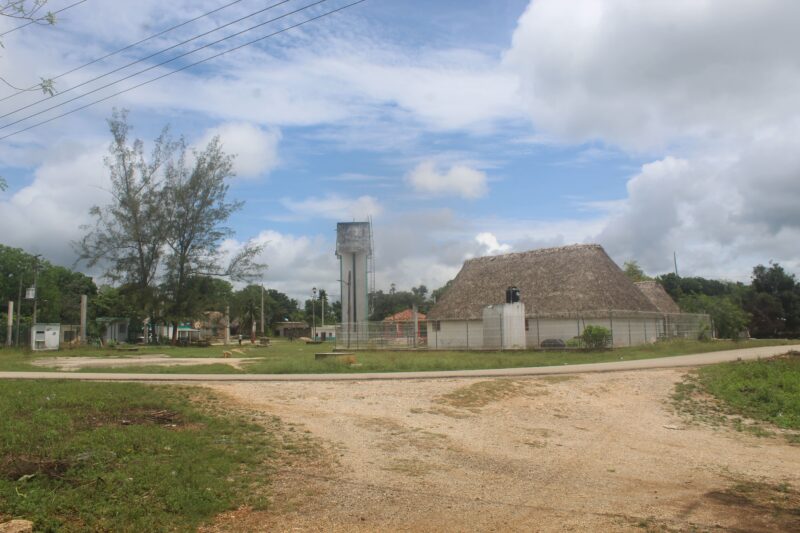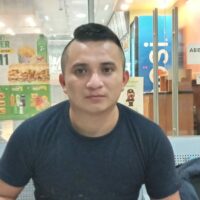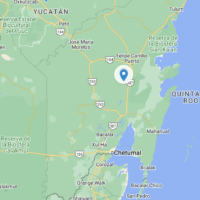 [1]
[1]Locality: (i)x K’o’opch’e’en, where the project will take place. Photograph courtesy Rodrigo Petatillo Chan.
 Name: Rodrigo Petatillo Chan
Name: Rodrigo Petatillo Chan
Language: Maya
Locality: (i)x K’o’opch’e’en,
Felipe Carrillo Puerto, Q. Roo.

Project summary:
Creation of short videos in Yucatec Maya on social networks.
The topics of the videos will be vocabularies, expressions of everyday life, as well as short stories or community stories.
Bix abeele’ex? Hach ki’imak inwóolo’on inmeyaho’on te’ proyecto “Activismo digital” yo’olal uséeger ukuxkíinta’al le maaya t’aan tumeen uyuumilo’obo’. Waye’, hach yaan k meyah ya’ab yéetel ki’imak óol.
My name is Rodrigo Petatillo Chan, I am originally from the community of (i)x K’o’opch’e’en (Kopchen, in Spanish), Felipe Carrillo Puerto, Quintana Roo, Mexico. I am currently a doctoral student in the Indo-American Linguistics program at the Center for Higher Research and Study in Social Anthropology (Mexico City).
I am currently in (i)x K’o’opch’e’en doing fieldwork, that is, gathering data for my doctoral thesis titled “An approach to multimodal expressives in Yucatec Maya.” My community has approximately one thousand inhabitants, it is a small community, but it has been growing very fast and has several schools up to the high school level. This town has great stories from its origin to its development dating back to the Caste War of Yucatán [2]. Also, it is a community that has a traditional festival in honor of the patron saint San Juan Bautista every year, as well as other festivals and traditions.
My project
The general objective of the project Ut'aanil ukuxtal (i)x K'o'opch'e'en ‘ (“Kopchen's talk of life”) is to revitalize and raise awareness about Yucatec Maya among the inhabitants (speakers and non-speakers of this language) of the community and to create short videos in Yucatec Maya on social networks. The videos will discuss vocabularies, expressions of daily life, short stories or community stories, among other topics. The project is mainly aimed at children, parents and grandparents (who speak or do not speak Yucatec Maya), for teaching-learning among peer groups.
The number of boys and girls who will participate in the project must be equitable in terms of gender and the language they speak. That is, half have to speak Maya and the other half do not have to speak Maya. In addition, five have to be girls and the other five boys. I have chosen this distribution so we can raise awareness among the children who do not speak Maya so that they are encouraged to do so with their peer groups. Those children will be encouraged to speak Maya, and, later, they themselves will transmit it to their own parents who did not teach them Maya at home, so that the parents become aware of this issue. Parents and grandparents will be involved, too, because the children will ask them for help to make short videos in Maya.
The first stage of the project will be that the children will be taught to use the necessary equipment to make the recordings, as well as a small reading-writing workshop for one or two months so that at the end they have a basic knowledge of it.
In the second stage, the children will begin to record the first videos on the aforementioned topics. These videos will be made in a group of pairs (made up of children who speak Yucatec Maya vs. children who speak Spanish).
The third stage would involve children working with their relatives (parents, grandparents and siblings) so that the community participates in the project and people get connected.
Finally, the members of the project will review of all the videos. They will transcribe, subtitle and translate (Maya–Spanish) the videos made mainly by children and then upload them on social networks for dissemination.
My motivation
I have been working to support my language for approximately 12 years, doing various linguistic and anthropological projects, as well as non-profit social work. I think that one of the problems encountered by scholars studying their own indigenous languages is the lack of support, mainly financial. In addition, many indigenous speakers have been unable to continue studying due to being far away from the institutions where they want to study.
I am satisfied with the work that I have done so far to support my language, I have researched several topics that had not been investigated before. Linguistic documentation is a way of saving the memory and knowledge of speakers. I feel encouraged because especially children are very active in working on projects related to their language. I noticed their interest years ago when I taught a course on reading and writing in Yucatec Maya. To tell the truth, children learn very quickly.
As a Maya speaker I want my language to be felt, heard, enjoyed, perceived and dreamed of in all possible areas. There has been a lot of digital and non-digital activism in various communities of the Yucatan Peninsula, but none of them has been focused on my community. Therefore, carrying out a project of this magnitude would have a positive impact on the inhabitants of my community.
